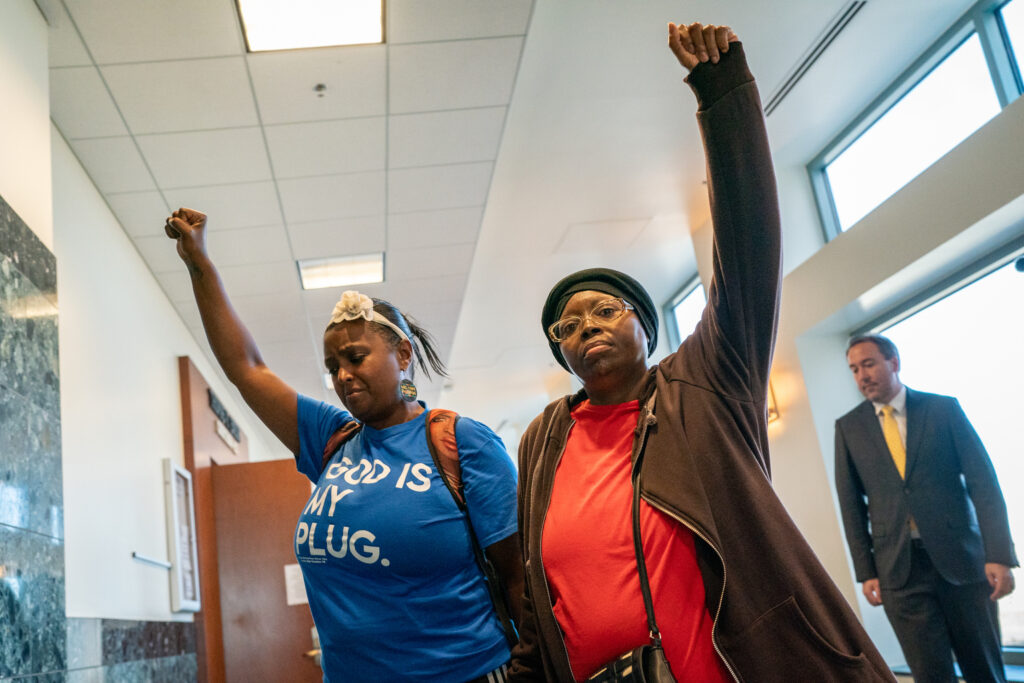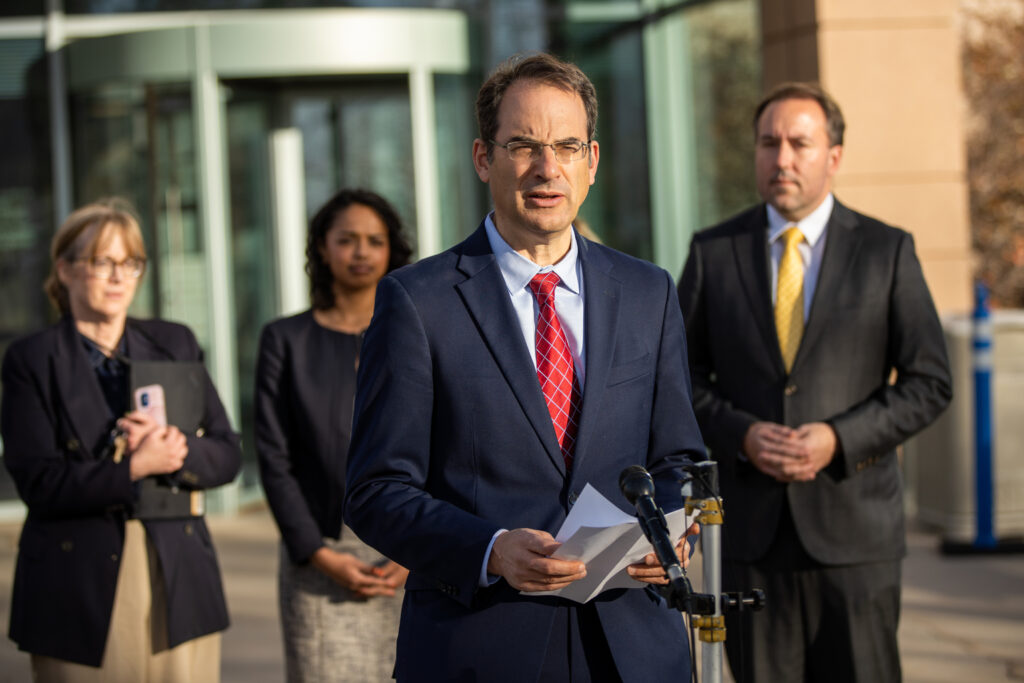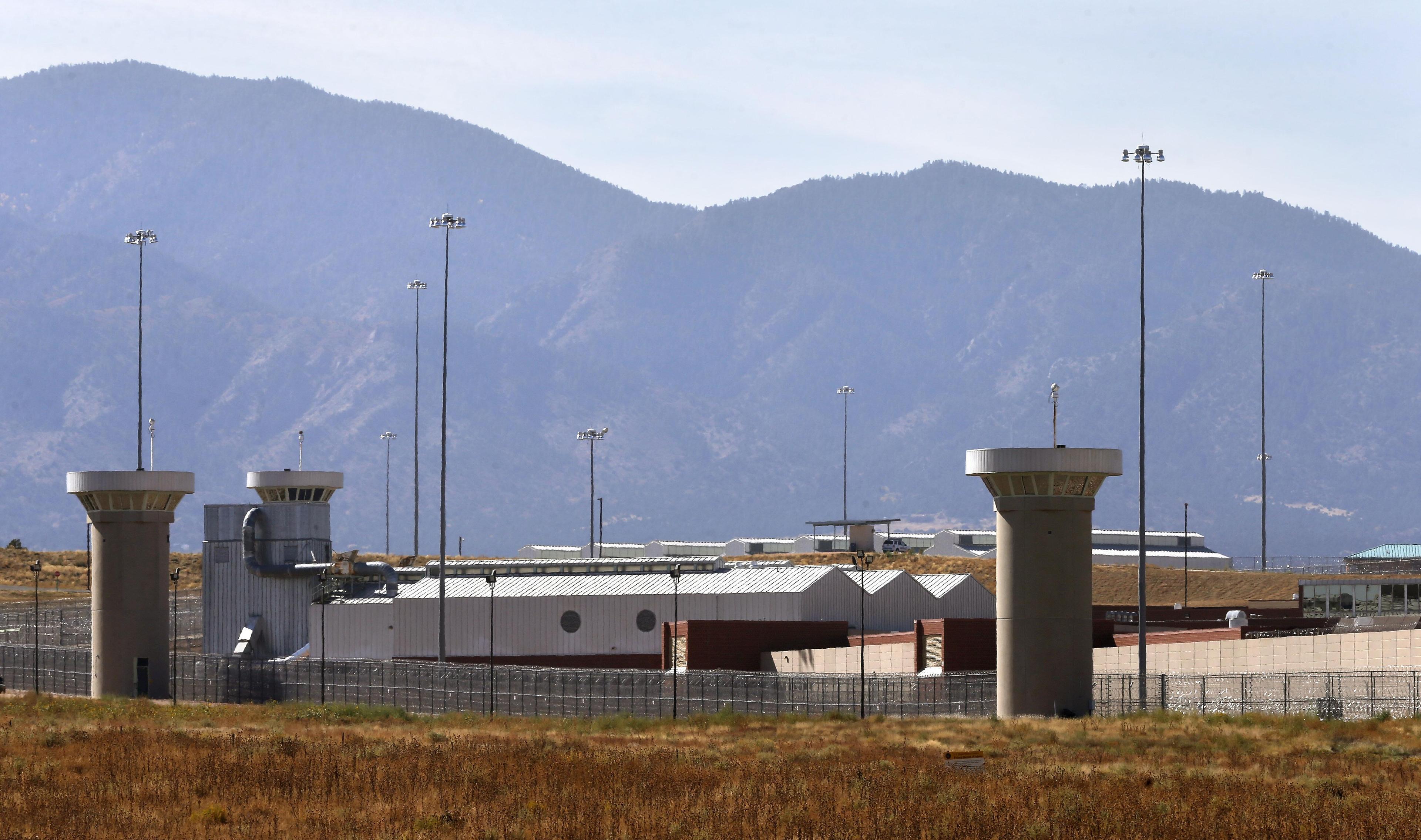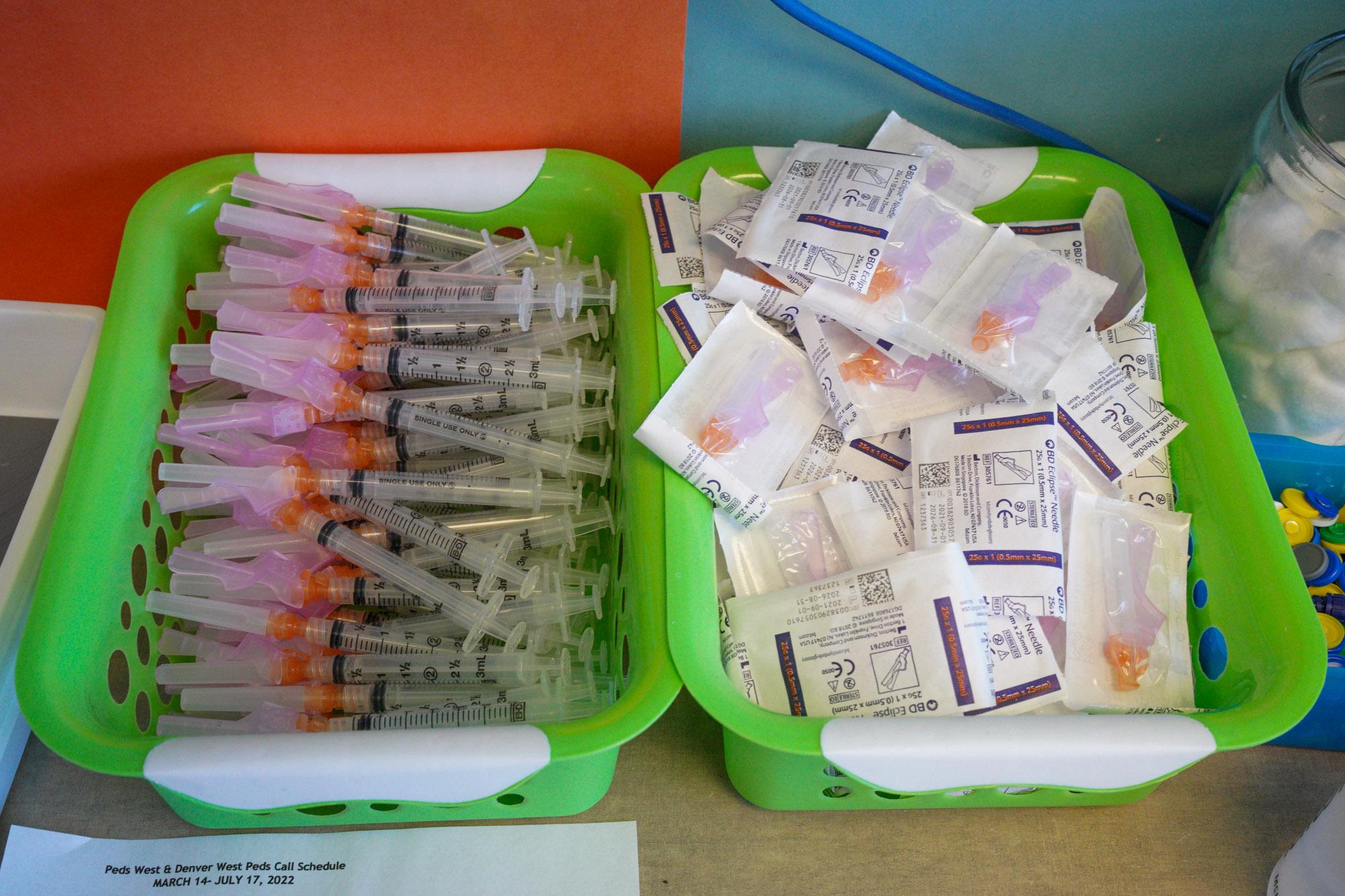
Updated at 6:19 p.m. on Monday, Nov. 6, 2023.
Aurora police officer Nathan Woodyard was found not guilty of recklessly contributing to the death of Elijah McClain after a jury deliberated for about a day.
Prosecutors say that Woodyard gave the 23-year-old unarmed Black man a carotid hold and failed to provide proper follow-up care while he was detained on the ground and unable to breathe.
Jurors, though, apparently believed Woodyard’s own argument under oath that he did what he was trained to do after the carotid hold — a police maneuver that cuts blood flow off to the brain and briefly causes unconsciousness. It is now banned in Colorado but was an accepted use of force at the time in Aurora.
Woodyard said he placed McClain in a recovery position, called medics and then trusted officers and paramedics to care for McClain while he composed himself that August night in 2019.
Woodyard tearfully told jurors he was weeping to his supervisor on the scene because he was fearful that he was going to die and needed to step away.
He is the second officer acquitted in the incident that roiled the Aurora Police Department and sparked statewide police reform, including a ban on carotid holds.
One officer, Randy Roedema, was convicted last month of criminally negligent homicide in McClain’s death.
The 12 members of the jury avoided eye contact with both Elijah’s mother, Sheneen, and Woodyard. When the verdict was read, McClain sat with Attorney General Phil Weiser and wept for several minutes. On the other side of the room, Woodyard sat at the defense table with his attorneys. His wife sat quietly behind him.
They left the room first after several minutes. He did not look over to the huddle around McClain.
She eventually walked out of the courtroom with a fist up. She held the hand of a friend and walked across the large Adams County Justice Center parking lot, both of them had their fists in the air. Media and at least one other advocate scrambled behind them. They eventually stopped and McClain asked for space.
“Please respect the boundaries that I am speaking,” she said, exactly quoting her son in his first moments after Woodyard went hands-on with him, according to body-worn camera footage.

During the three-week trial, prosecutors failed to prove to jurors that Woodyard, who had been on the police force at the time for about two years, had ample training and experience to know what to do when approaching McClain that night after receiving a 911 call on a suspicious person.
They said Woodyard ignored APD policies that officers approach members of the public with empathy and that they practice active listening. He ignored mandates for de-escalation, prosecutors said.
And, state attorney Jason Slothouber noted, Woodyard ignored perhaps the most important thing of all: required medical follow-up and diligence after placing a carotid hold, which cuts off blood flow to a person’s brain and usually briefly causes them to lose consciousness.
“Four years later he has empathy,” Slothouber said, referring to Woodyard, who tearfully testified in his own defense earlier this week. “But the version of the defendant that Elijah McClain got is the one who caused his death by ignoring his training, ignoring Elijah’s claims and pleas for help, that he can’t breathe and that is exactly the story he was trained to avoid. That is why he’s guilty.”
Defense attorneys for Woodyard acknowledged the sympathetic nature of the case, saying during closing arguments, “Elijah McClain matters.”
They convinced a jury that Woodyard’s limited interactions with McClain that night did not amount to a “reckless negligence” in causing his death.
Instead, they squarely laid the blame on the overdose of ketamine given to McClain by the paramedics.
“There are people guilty of killing Elijah McClain but they are not here today,” said Andrew Ho, Woodyard’s attorney. “Nathan Woodyard did not kill Elijah McClain.”
The forensic pathologist who conducted his autopsy said McClain's cause of death was complications from ketamine following forcible restraint by police.
McClain, a Black massage therapist who was living in Aurora, died a few days after his violent encounter with law enforcement and a high dose of ketamine given by paramedics on the scene.
He was suspected of committing no crime when he was walking home from a convenience store late on a Saturday night, listening to music and carrying a bag of iced teas. Officers forcibly detained him after getting a call on a suspicious person.
Three officers and two paramedics were charged criminally in his death. Roedema, who was also on the scene with Woodyard, was convicted of criminally negligent homicide last month and another, Jason Rosenblatt, was acquitted of all crimes. The paramedics’ trial is expected to start later this month.
Woodyard’s contact with McClain that evening was shorter and more limited than Roedema and Rosenblatt, who were also on the scene almost from the beginning and stayed with McClain after he was handcuffed.
In hours of body-worn camera shown to jurors, Woodyard can be seen leaving the scene at several points and walking around, not paying attention to what was happening with McClain, who was struggling on the ground, detained.
Prosecutors have called this abandonment and said it was clearly reckless negligence in caring for a person who was medically deteriorating after being given the carotid hold, which was a last-resort use of force and is now banned in Colorado.
Aurora’s protocols required officers to call for medical help after a hold, check the suspect for coherence and, witnesses testified, put a person who received the hold in the recovery position.
Defense attorneys maintained the actions Woodyard took right after he administered the carotid hold, which was an approved use of force at the time, exonerated him from any recklessness. That included removing McClain’s mask after he heard him complain that he couldn’t breathe and was throwing up and placing him in the recovery position, as required.
They said he left the scene because he was emotional and needed to step away and talk to his supervisor. He trusted officers Roedema and Rosenblatt were going to take care of McClain.
“Nathan Woodyard entrusted Elijah McClain to the care and custody of his fellow officers and entrusted Elijah McClain to medically trained professionals. Elijah McClain died,” Ho told the jury during closing arguments. “That matters. Nathan Woodyard did not kill Elijah. He's not responsible for what other people did or did not do.”

There were hours of testimony in the trial about the recovery position, which means a person isn’t prone, or face down, on the ground or on their back, which can cause them to aspirate if they are throwing up. One doctor said McClain had a potentially lethal amount of vomit in his lungs that he inhaled during the struggle.
During closing arguments, Slothouber made the sounds of choking and aspiration from his own throat to the jury. He also played the sounds of the body-worn camera footage of that sound at full volume.
Woodyard’s attorneys said he initially put McClain in the proper position but that when he walked away, his fellow officers didn’t keep him that way. They also pointed out that Woodyard never again heard McClain say he couldn't breathe after he removed the mask. McClain did actually say it another time, but Woodyard wasn’t on the scene.
Ho also said Woodyard didn’t have anything to do with the conversations about giving McClain ketamine or how much sedative to give him and that, generally, police officers aren’t medical experts and that is why Woodyard called the paramedics.
“They're not trained to spot acidosis, hypoxia,” Ho said to the jury. “And even all those experts who are trained to do that, they can't agree … on what exactly happened.”
In body-worn camera footage, paramedics and medics were on the scene but seemingly standing back waiting on law enforcement. But multiple officers who testified in this trial said they felt completely fine about McClain’s worsening condition because medics were on the scene. When the paramedics finally did get involved, they misjudged McClain’s body weight and gave him a bigger dose of ketamine than they should have.
McClain went into cardiac arrest in the ambulance shortly afterwards.
“Nathan did not know that the paramedics would come in and overdose Elijah McLean with ketamine,” Ho said.
Woodyard took the stand earlier last week and said he left the scene because of what happened with McClain early on. In the initial struggle to take McClain down the grass, Roedema told Woodyard and Rosenblatt that McClain reached for a gun.
There is no video evidence that McClain moved for a weapon because the body-worn cameras fell off; even defense attorneys acknowledge that probably didn’t happen.
But, at the time, Woodyard said he didn’t know that. He said he panicked and pictured getting shot and killed, which is why he administered the carotid hold.
He also tearfully told the jury that he wished he could redo the entire situation from the evening and that he regretted what happened.
Woodyard left the courthouse with his wife, who sat behind him during the whole trial. His attorney, Megan Downing, said, “we believe it was the right verdict … if a tough one.”









